by Jenny Rose | Sep 9, 2023 | Choice, Power
I’m a spinner, a speeder, a thought racer. (Yes, I know it doesn’t help. I know rocking chairs and hamster wheels go nowhere. I know worrying is pointless.) Under the right conditions, the inside of my brain is like a dusty attic filled with hysterical cats zooming in all directions, climbing the walls, knocking over piles of junk, filling the air with dust and yowls. Chaos. Destruction. I call it speeding. I call it anxiety. The world calls it racing thoughts.
Whatever we call it, it’s a miserable state of mind, and a common one.

Photo by Quino Al on Unsplash
Herding cats, as any cat lover will tell you, never works. Sheep, maybe. Cows. But not cats.
However, at times familiar life goes off the rails in such varied, complex, and unforeseen ways I find myself once again herding cats, usually during the hours I need to be sleeping, though sometimes those hours bleed over into days when I’m supposed to be focusing. On something productive or something relaxing or something. But all I’ve got are catapulting (pun intended) thoughts and emotions racing around in my brain.
Not long ago, before the start of my current cat rodeo, I read somewhere (probably Substack) about The Rule of 9s. I’ve since gone back to look for it, but I can’t find the original source. Anyway, I didn’t come up with it myself. I wish I had.
The Rule of 9s is a tool used to identify what really matters. Or, if you like to look at things bass-ackwards, like me, what really doesn’t matter.
This morning, for example. I could garden, work on business at my desk, write, or make a Spotify playlist. I have just under two hours at my disposal before I head off to work.
I have a lot of desk business just now as my brother and I (mostly my brother) wind up my recently deceased mother’s estate and deal with our inheritance. By inheritance, I mean not just assets, but the inevitable emotional inheritance we all receive from our families of origin. What I’ve heard is true. When a parent dies, we cannot be prepared for the ways it changes us and how uncomfortable some of that change is.
My metaphorical cats – these mixed up thoughts and feelings — pull me in different directions at the same time. Everything feels overwhelming right now. It’s irritating. Two items on my grocery list and I’m overwhelmed. Now and then I have a few minutes free from the inundation, but I get a call, a text, another document to sign, and I’m overwhelmed again.
Fortunately, I just learned The Rule of 9s.
So, the option of gardening. It’s hot outside. Really, really hot and humid. Just when the weather should be getting crisper and cooler, a heat wave has arrived. It will ease in the next couple of days, but it’s brought a resurgence of mosquitoes and it’s not fun to be outside. So, no garden this morning. I’ll wait for cooler weather. Is that a crisis?

Photo by Morgan Sessions on Unsplash
Will gardening or not gardening matter in 9 seconds? In 9 minutes? In 9 hours? In 9 days? In 9 months? It might start to matter then, because I’ll be making spring plans and whatever progress I make this fall will affect those plans. But it’s clearly not urgent. I won’t remember choosing or not choosing gardening today.
Business at my desk. I’ve already done some of that this morning. Balanced the checkbook. Looked for a document I’m waiting on from my bank (not there yet). Made some notes. Did some planning. Considered options. I have money in my account. All the bills are paid. I don’t need to spend anything today. Will taking care of more business or not taking care of more business matter in 9 seconds? Nine minutes? Nine hours? Nine days? It might start to matter at that point, as one thing leads to another as we wade through this process. If I stay on top of tasks, step by step, I know I’ll eventually come out of the tunnel with effective systems in place that work for me and respect my goals and values. Tempting to start herding the cats quivering on my desk, but I only have two hours and nothing is urgent.
Make a Spotify playlist. I may shortly have an opportunity to bring a dance program to the community. I’ve tried several times in years past without success, but I haven’t given up hope. Now that I’m on Spotify (though I have misgivings about how platforms like this fail to support artists), I wanted to get a few of my dance playlists put together. I have them burned onto CDs and in iTunes, but not on Spotify. However, I don’t have any solid dates for dance now. It’s all in the planning stages. At some point it will matter, but not right now.
Writing. It’s my weekend to publish on Harvesting Stones. I don’t have to. It’s not required. But I’d like to, if for no other reason than it’s my usual routine, a stepping stone in the current chaos, and it comforts me to be doing something normal. Not to mention how much I enjoy it. Hard to think about focusing on it, though. All those cats whizzing around …
Will writing or not writing matter in 9 seconds? Nine minutes? Nine hours? Nine days? It won’t matter to the world, but it matters to me. It will matter to me in two days, when Saturday morning comes and I either do or do not have a rough draft I’m happy with.
So I’m writing. And while I’m doing that, miraculously, the other cats settle down. Tired, I guess. Maybe they’ll curl up in the chaos they’ve wrought and sleep a while. Sleep is good.
As I live my life and listen to the inside of my head, especially the anxiety, the fear, the resistance, the catastrophizing, I pull out The Rule of 9s and apply it. Will this matter in 9 seconds? In other words, will I die in 9 seconds if I don’t do whatever-it-is or figure it out, completely and perfectly? How about in 9 hours? (Have you ever noticed how crazy your nighttime I-can’t-sleep thoughts are in the light of day?) In 9 days will I even remember whatever feels stressful this minute? Will the fearful thing I can imagine happening be important in 9 weeks? In 9 months? In 9 years?
The Rule of 9s requires I slow down and think. The questions give me perspective, help me with a reality check. I stop reacting and remember my power to choose. I decide what’s more important than my peace of mind (not much). Hysteria is contagious; so is calm.

Photo by Ryan Moreno on Unsplash
Applying The Rule of 9s settles the cats right down. One or two may still zoom, because cats are contrary like that, but the chaos diminishes as I become intentional and mindful. I can find some focus, at least for a few minutes. I know what to do next, in the next 9 seconds, anyway. The next 9 years can take care of themselves.
Questions:
- What are your strategies for pulling yourself out of racing thoughts and anxiety loops?
- How do you choose priorities?
- Is your experience one of choice in life, or one of reaction and compulsion?
- Share something ridiculous that’s kept you up at night.
Leave a comment below!
To read my fiction, serially published free every week, go here: 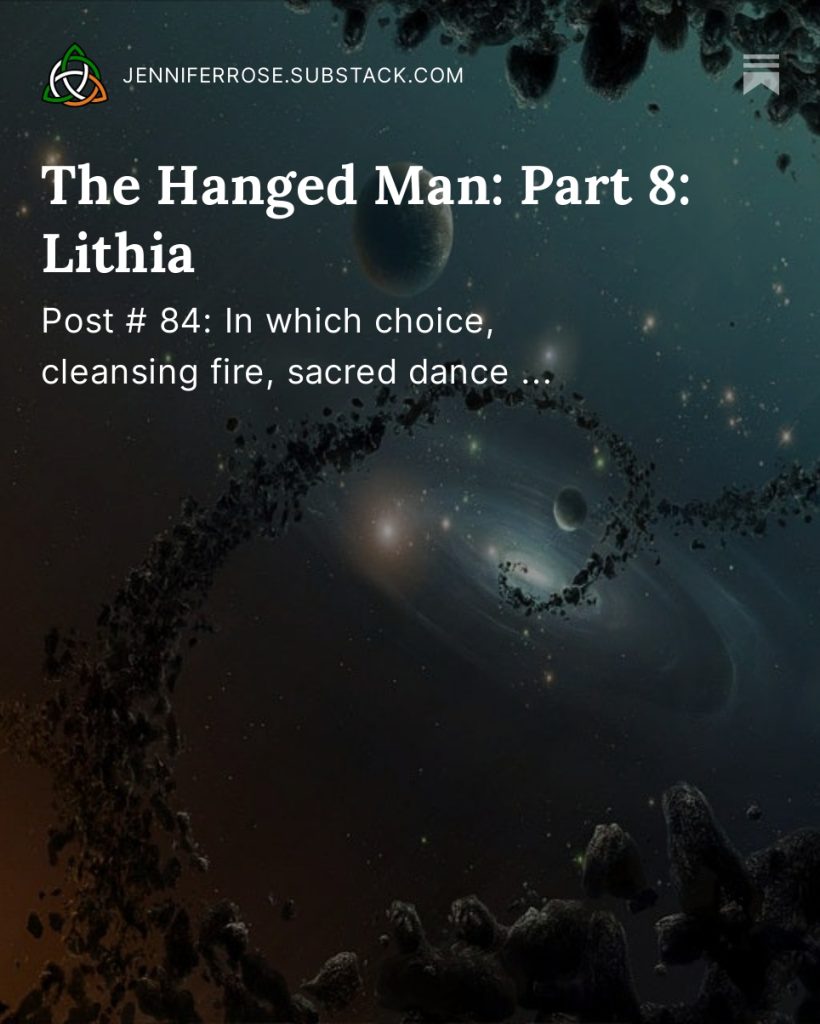
by Jenny Rose | Aug 5, 2023 | Power
Last week a Substacker I follow, Candace Rose Rardon, illustrated a memory I shared with her. I was absolutely thrilled. The union of my words and her art spoke to one of my core values: collaboration.
Collaboration is about power management. It’s defined as working with someone. Not directing them. Not submitting to them. Working with them. In other words, sharing power – power-with rather than power-over.
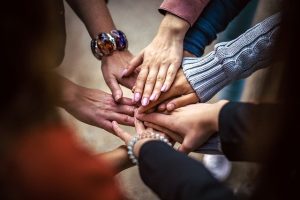
Image by Bob Dmyt from Pixabay
Is it just me, or are we as a culture moving away from sharing power rather than toward it?
Collaboration and cooperation lie at the heart of my fiction. All my life I’ve been preoccupied with working together, but I never had adequate language or studied power until I learned emotional intelligence. At that point the light dawned. I reviewed my relationships, both family and otherwise, through the lens of power.
It was a grim review. I set out to reclaim my power.
Let’s be clear: reclamation is not stealing.
I didn’t want to take power away from others. I wanted to reclaim what had been taken from me.
This involved needs, boundary work, and many other moving parts, most of which I’ve written about here over the last seven years (almost exactly seven years … wow), and all of which are woven into my books.
Speaking of my books, I have a dream that one day a visual artist will read my work, become inspired, and want to illustrate it. That’s not all. (Might as well dream big, right?) In the same dream a musician (drums and flute or pipe, at least) reads my work, becomes inspired, and adds music and a soundscape to it. I even dream one day we’ll develop the ability to incorporate scent into reading. 
I am a sensual person, and my writing reflects that. I myself see my characters and my world of Webbd vividly, but I’m not an artist. I respond deeply to music physically and emotionally, but I’m not a musician.
In every relationship I’ve sought collaboration. I’ve wanted a safe place to have an authentic voice, express an opinion, make a contribution. I’ve wanted the power to make choices. This has been true in the context of family, friends, spouses and boyfriends, coworkers, and community.
I have not been noticeably successful until the last ten years.
No matter how talented, strong, or knowledgeable we are, healthy collaboration can only make us bigger. Collaboration is tricky, though. It’s messy. We’re forced to deal with conflict, with different visions and voices than our own, different backgrounds, different belief systems, different ways of looking at the world and interacting with life. It’s work. It stretches us uncomfortably. We might have to be wrong (gasp!) and someone might find out we were wrong (horrors!).
Plenty of people say they want to collaborate when their true intention is a hostile takeover. Others seek collaboration as a way to make money or leverage other aspects of social power. Their agenda is to accrue power, not share it.
What Candace Rose Rardon did was extend a gift of generosity. When I sent her my memory I had no power over whether she chose to illustrate it or how she would illustrate it. I handed her my words and went on with life. I had no expectations. She sent back something beautiful woven of my words and her art. I’ve never met her. We exchanged no money. I know very little about her, but I do know this: she’s part of my tribe. She’s a creative collaborator.
Collaboration requires a willingness to be flexible and the willingness to accept someone’s vision regarding our art. As creators, we need to loosen our grip on our masterpieces and allow others to widen us. Perhaps someone else visualizes our character slightly differently than we do. Perhaps they see the character more clearly, or more fully than we can. As collaborators, we may be pushed to do more than we’ve done before, take new risks, try new things. Healthy collaboration makes us all more powerful, more expansive, more interesting, more textured.
We are stronger and more beautiful together than we are apart.

Photo by Helena Lopes on Unsplash
Collaboration is everywhere. It’s the falling rain and early birdsong on a spring morning. It’s the calling of shorebirds against the background of surf. It’s the buzzing of a fat bumblebee in a fragrant blossom. The world is unbelievably sensual. Walking through tall grass this time of year, the stems and heads turning straw-colored, the small scratching prick of grasshopper legs on my bare skin, the scent of warm grass in my nostrils, is a miracle of collaboration. A garden exists because of collaboration between countless forms of life and the weather.
We can’t collaborate in every situation all the time. Leaders lead. Parents parent. Bosses must manage their people, teachers their students. We all have areas in our lives we like to manage solo, including areas in our creative lives. On the other hand, we are seeing the consequences of no collaboration: chaos, fear, hatred, division, destruction, and social breakdown. We are now successfully being manipulated into choosing not to collaborate even with ourselves, but with consumerism, capitalism, and ideology instead.
Collaboration is wide. It’s not only about human-to-human interaction. If we don’t figure out how to collaborate with our planet, with the human and non-human life around us, and (perhaps most importantly) with ourselves, we will not thrive. We’ll solve no problems. Nothing will change. We’ll meet challenges as individuals and as communities and countries poorly. We will keep ourselves small, disorganized, and weak.
Or we can choose to combine our knowledge, our skills, our vision, and our humanity.
Questions:
- How have you collaborated successfully with others?
- How have you struggled with collaboration?
- What’s the hardest thing for you about sharing power with another?
- Are you open to collaboration? Why or why not?
Leave a comment below!
To read my fiction, serially published free every week, go here: 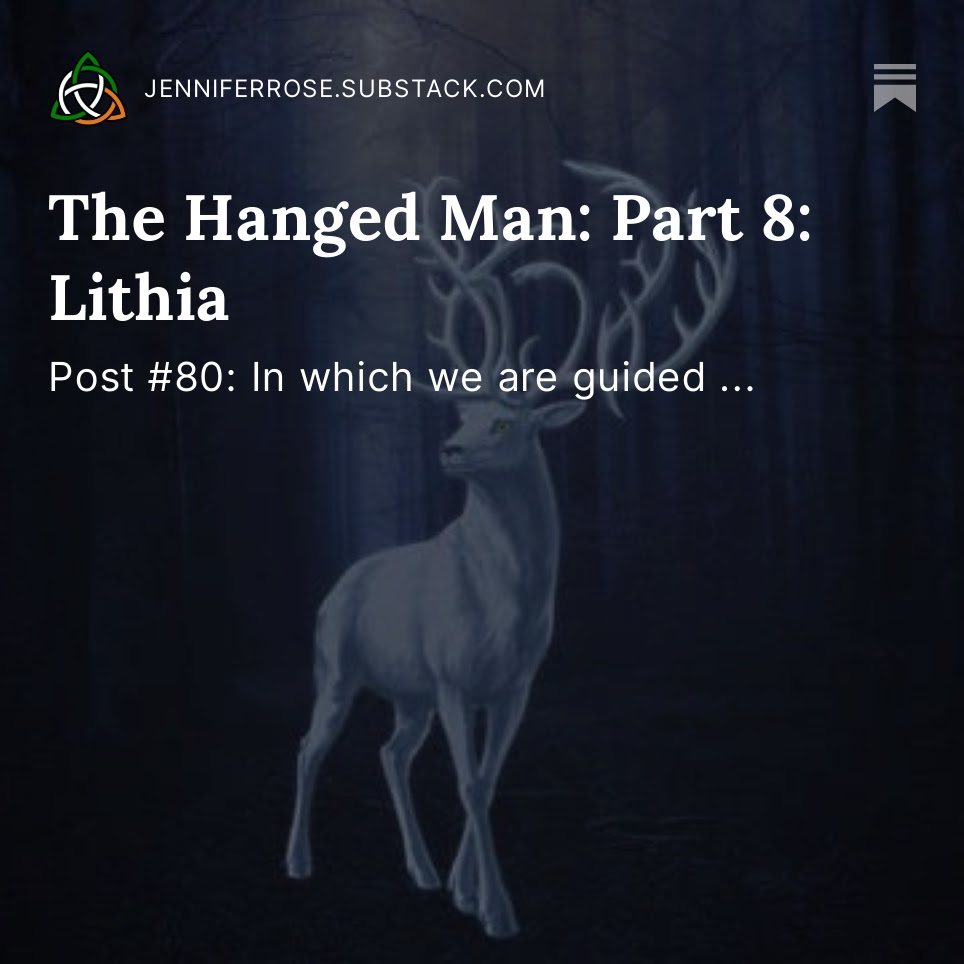
by Jenny Rose | Nov 12, 2022 | Choice, Power
I’ve dedicated the last decade of my life to reclaiming my personal power, each step on the path made visible on this blog in the hopes that others might also find their way into a healthier, happier, more effective life.

Photo by Jon Flobrant on Unsplash
It’s been an extraordinary journey, one I hope will never end as long as I’m breathing.
At the heart of personal power is our ability to choose.
I’ve always been aware of how uncomfortable I am choosing for anyone other than myself. For years I wasn’t able to choose effectively for myself; nothing in me wanted the power to choose for others. Hand-in-hand with this part of my experience is an automatic, knee-jerk stubbornness and opposition to those who try to choose for me or anyone else. It’s been a longstanding family joke: Don’t tell me what to do!
I’ve never been friendly toward this kind of authority.
As a parent I was unwilling to take on the role of a policewoman. I wanted my sons, as teenagers, to use their excellent brains and make their own choices, then deal with their own consequences. As I raised them, it slowly dawned on me the choices I made as a mom, though I always believed they were in the best interests of my sons, might have been wrong for them. I began to realize how much time we all spend in frustration over what those around us should and shouldn’t do, including our kids. I decided to stop discussing what others should choose. I still noticed the commentary in my head, but I got better at not letting it out of my mouth.
One day, I looked at my eldest son, who was going through a bad patch, and heard myself say, “I want the best for you, but I don’t know what that is.” I recognized that was the truth, and felt humbled. It broke my heart to see him struggling and unhappy. I would have done anything to have “helped.” But I didn’t trust my motives. Of course I knew what I thought he should do, but was I looking for him to feel better or for him to make me feel better? I couldn’t be sure. I just wanted things to be better. Wanted it desperately, but I also wanted him to figure out how to help himself.
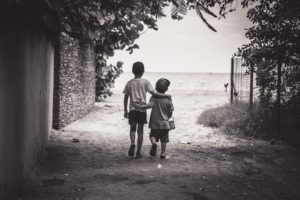
Photo by juan pablo rodriguez on Unsplash
I’m very aware of the word ‘should.’ I cut it out of my writing. I cut it out of my thoughts and speech. I’d even go so far as to say it’s a toxic word. I don’t apply it to myself and I don’t apply it to others. It never fails to appear when I’m arguing with what is or have otherwise stepped out of my own rightful power and am trying to control a situation that’s not mine to manage. It also shows up when I’m being mean to myself.
Now, suddenly, I find myself in a position of needing to make choices for a loved one who at this moment is not able to choose for themselves.
This is not like choice-making for my children. Kids are pretty resilient. I knew I would made mistakes as a parent, and I did. But I could always choose again. With small children, there’s a long future in which to reconsider, make new rules, learn in real time. I wasn’t uncomfortable with it. As they grew up, I gave them more and more power to choose for themselves and stepped back while they experienced the consequences of their choices.
Now they’re adults, and it’s harder. Now I really have nothing to say about their choices as men in the world. It’s not my business. Some of their choices are, to my mind, tragic and self-destructive, and I’m afraid for possible consequences. I’m afraid for my own pain and grief if some of those consequences occur. But I accept the only power I have is to love them and make sure they know it.
And making choices for an aging loved one is different again. The fear I’ll do it wrong is terrible. I’m working in a lifetime context where I never did do anything right, so I’m fighting that old dynamic every minute while I calmly go about gathering tools, resources and information. I know I’ll do my best and I’m confident in my own abilities and the strength of my love and intention, but choice is dynamic. It takes time to choose, observe outcomes, consider what could be better, and choose again.
I don’t know how much time I have. I don’t know how much time I want.
Working with a frail, injured, confused senior feels brittle. I may not have time to manage choice and outcome. Not only that, but when I choose for myself if I’m unhappy with the consequences I only have myself to blame; I bear all the outcomes, which is as it should be. But if we must choose for someone else, they must experience the consequences of our choice. And that’s a heavy burden for me. I feel enormous pressure to choose well, to not make anything worse, while at the same time I can’t see choices that will make anything much better.

Photo by roya ann miller on Unsplash
As I struggle with all this, mid-term elections have occurred and the final votes are being counted. The news is full of debate, discussion, and violence revolving around limiting choice and forcing “choice.” As always, I cannot get my head around people who think it’s okay to impose their ideology on others. I support freedom of personal choice (as long as it doesn’t harm others) in most circumstances. I wouldn’t impose my beliefs or choices on others. The idea is appalling. But I also don’t accept anyone has the right to restrict my access to vote or what I do with my reproductive ability. I refuse to comply with such imposition, even if it becomes law. You might as well arrest me right now.
A conversation recently took place at the pool facility where I work between a woman of child-bearing age and a male senior. She asked him why he thought it was okay for him to decide she couldn’t get an abortion when the choice was personal and had absolutely nothing to do with him. He said such a choice would hurt his feelings.
This drops my jaw. I don’t know whether to let rage catch my hair on fire or laugh. It hurts his feelings when people make choices incongruent with his belief system and ideology? Or it hurts his feelings when women are empowered? Or it hurts his feelings when he can’t control what others choose? Or he feels entitled to never have his feelings hurt?
Wow. Just wow.
Choice. It’s so easy to say to others, or to think, they should do this, or this, or the other. So easy. But I never wanted to run the world. I only wanted to be in charge of myself. Now a loved one needs me to be there for them, and I will be there every step of the way, giving it my best, just as I always have. But it’s not fun. I don’t want the power. I accept I’m the right one to have the power, but I never wanted it. How can I possibly know what’s best for another human being? How can any of us have the arrogance to think we know what’s best for everyone in every circumstance, let alone anyone in any circumstance? At times I can barely choose wisely for myself, let alone anyone else.
To read my fiction, serially published free every week, go here:
by Jenny Rose | Sep 11, 2022 | Choice, Power
Probably every child is told we all have to do things we don’t want to do.

Photo by Cristina Gottardi on Unsplash
Children are concrete, and I was no exception. When I heard we all have to do things we don’t want to do, I thought it meant that’s what life was supposed to be about, a kind of slavery to all those things we don’t want to do. No one talked to me about balance, or doing the things we do want to do.
It made life seem like an unhappy business, years and years of unending duty, responsibility, and doing what I didn’t want to do. No recess. Or maybe what I really wanted to do was bad and wrong? Maybe I should want to do what I didn’t want to do. I wasn’t sure. A part of me went underground. I didn’t want anyone to know how bad I was, how flawed. I worked hard at the things I didn’t want to do and hid the things I did want to do, in case they were wrong.
But I couldn’t conceal the feeling of wanting and not wanting from myself. I used to make hidey holes in whatever house we were living in at the time and go to ground with a book, but I always felt guilty. I wanted to read. Doing what I wanted to do was bad. I should have been helping my mom do all the things she didn’t want to do.
The pronouncement that we all have to do things we don’t want to do is stated as a Cosmic Truth, especially as an adult tells it to a child. It’s loaded with feelings and experience a child can’t possibly understand, but the subtext was clear to me:
Life is not much fun.
I can’t resist picking apart Cosmic Truths as an adult, and as I think about this one it occurs to me it really has to do with personal power more than wanting or not wanting. It’s not framed in terms of personal power because our emotional intelligence is so low. Making choices based on whether we want to do something or not is childish. Power resides in the act of choice, not in the wanting or not wanting.
Steering our lives solely by our desires is hedonism, a belief that satisfaction of desires is the purpose of life. Desire, though, is so shallow, so fleeting. And it’s never permanently satisfied. No matter how well and pleasurably we’ve eaten, we’ll be hungry again. Desire is a treadmill we can never get off.
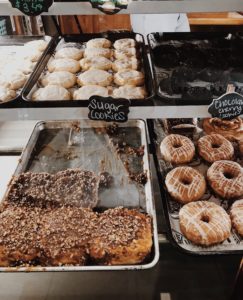
This is not to say we shouldn’t ever choose something we want or say no to something we don’t want, but our desire is easily manipulated. That’s why advertising works. If we can be easily manipulated, we’re not standing in our power. Addiction is based, at least in the beginning, on wanting and not wanting.
A more useful question than What do I want to do? is What would be the most powerful thing to do? We might want to eat a carton of ice cream, but a walk feeds our health, well-being, and thus personal power much better. After all, one carton of ice cream leads nowhere but to another. Personal power can lead us to joy and experience a carton of ice cream never dreamed of.
- If we don’t choose to do difficult, frightening, or new things, we’ll never grow.
- If we don’t choose to take care of our bodies, they won’t function well.
- If we don’t choose to be self-sufficient and resilient, we’ll be dependent.
- If we don’t choose to learn anything, we’ll remain ignorant.
- If we don’t choose to plan ahead, prepare, or manage consequences, we diminish our choices, waste resource, and weaken the contribution we’re capable of making.
- If we don’t choose the responsibility of commitment and making choices, someone else will make our choices for us.
And so on.
I’m changing the frame. I’m less interested in what I want and what I don’t want and more interested in how my choices affect my power, and the power of those around me. I’m willing to do what I don’t want to do if it’s a step on a road leading to integrity, power, healthy relationship, or anything else important to me. At the same time, I can exercise my right to say no to things that won’t take me where I want to go.
It’s about power, not desire. Any three-year-old can want and not want. It takes an adult to manage a healthy balance of personal power.
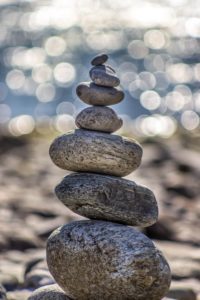
Photo by Deniz Altindas on Unsplash
by Jenny Rose | Jul 9, 2022 | Power
When we bought our new house, a flagpole and the American flag came with it.

Photo by David Beale on Unsplash
The day Roe v. Wade was overturned, we took down the flag. I don’t recognize America anymore. The democracy I grew up in is languishing and I no longer feel our government represents the best interests of people or planet. It certainly isn’t interested in surviving and thriving for any but a select few power-over people who are impotent, incompetent, and emotionally bankrupt, not to mention unbelievably stupid. These times are the logical end stages of capitalism. We are so far astray we have made money into a god and worshiping that god has us all on our knees and many of us face down in the street being murdered. I’m not celebrating. I’m grieving. I’m angry.
The pandemic years and increasing awareness and visibility of systemic racism brought the discussion of freedom into daily discourse. What freedom is. What freedom isn’t.
Freedom is power. People who work for power with others focus on supporting an equitable playing field for all. That means some people need to lose some power and others need to have theirs restored so we all have equal access to resource.
Power, by the way, is not defined by money. We’ve been culturally brainwashed to believe it is, but it’s not. Who benefits from the persistent and relentless narrative insisting it is? Are you benefitting?
People who work for power-over are afraid. Fear breeds hatred. Other words for hatred are racism, homophobia, and bigotry. Power-over people, like any tyrant, fear rebellion, and all their energy goes into controlling information and brutally silencing dissent or discussion.
What we are allowing to take shape is a dystopian world. It’s not a movie we’re going to walk out of in two and a half hours. It’s not a science fiction book. It’s not a role-playing game.
It’s real, and it’s really happening. Just like climate change, it’s not something to scare or depress ourselves with and then, like Scarlett O’Hara, tell ourselves we’ll think about it tomorrow. Tomorrow was yesterday. Climate change and the end of democracy are not far-off footsteps in the night-dark and scary forest. They’re here. They’re now. They’re in our tent with us.
Here are characteristics of a dystopian society:
- Communication (misinformation) is used to control citizens.
- Information (facts), critical thinking, and freedom are restricted.
- Citizens worship a figurehead or ideology.
- Citizens perceive they are under constant surveillance.
- Citizens fear change, new information, or new experience. Anything or anyone different is perceived as a threat to existence. Conformity is paramount. Individuality and dissent are stamped out.
- Citizens are stripped of their humanity.
- The natural world is raped, poisoned, and distrusted.
- Controls force citizens to accept the illusion of a perfect utopian world.
Dystopian controls include corporate, bureaucratic, technological, and philosophical/religious entities.
Welcome to the dawn of dystopia, people. For most of us, freedom is slowly vanishing, but it’s still possible to reclaim it. There are people who see clearly and speak and write the truth. Some of us believe in the common good and in living in service to others, to justice, and to the planet. We can fight. We can refuse to be silenced. We can hold fast to one another and balance the growing hate in the world with our love and righteous anger.
I’ll leave you with a couple of thoughts from Toni Morrison:
“The function of freedom is to free somebody else.”
“Freedom is choosing your responsibility. It’s not having no responsibilities; it’s choosing the ones you want.”
Be well. Take care of yourselves and each other.

Photo by Sue Tucker on Unsplash
by Jenny Rose | Jun 11, 2022 | Power
Can you walk away? Will you choose to?

Photo by Dan Gold on Unsplash
This piece from Leo Babauta hit my Inbox recently, and I’ve been turning it over in my mind.
Before I go any further, I need a moment to sit here and shudder. Because walking away is hard. It’s devastating. It’s an atomic bomb.
At least it’s felt that way when I’ve done it in my personal life, probably because I’ve waited, dithering, denying, distracting, hanging on and trying harder, so long for things to change. For me to change. For the other person to change. For divine intervention. For some event or person to rescue me.
By the time I do walk away I’m utterly exhausted and used up, and I hate myself far more than those affected by my walking away, though they, of course, don’t understand that. The relief inherent in walking away, the freedom, the reclamation of personal power, have only made me hate myself more.
Babauta’s article doesn’t start with the interpersonal stuff, though. He comes at it from a minimalist perspective. Can you walk away from an unhappy job? From a new car? From a deal or negotiation? From a tempting but unethical situation in which you might gain? From a new gadget or toy you really want but don’t need and can’t afford? From being too busy, too noisy, too tired, too stimulated?
Can you walk away from what the neighbors think, or your family? Can you walk away from the belief you need any particular person in your life to be happy? Can you walk away from your hopes and the beautiful dream you know is never coming true? Can you walk away from a toxic situation you’re deeply invested in? Can you walk away from the things and/or people destroying you?

Photo by Ian Espinosa on Unsplash
If you can’t walk, can you crawl away? On your belly, clawing at the ground, sobbing, naked and alone, can you crawl away?
It’s more than that, though. Will you?
Most of us can walk away if we have to. Many of us have had to and have done it. But who hasn’t felt stuck, unable to walk away, no matter how dark and dirty our fantasies are of leaving it all behind?
(Come on, I know you’ve had that fantasy at some time or another. Get in the car and drive until … until you’ve reached the edge of the world, of your life. Until you’ve run out of money or gas. Until you hit the ocean. Until you can stop.
Or go out the front door and start walking without looking back. Disappear. Vanish like a drop of water in the desert. Become nameless, faceless, rootless, homeless.)
But sometimes we feel stuck. Forever. Or what might as well be forever, because in this moment we’re so tired, so drained, so empty, there’s no comfort in the thought that things will change someday. One day.
One day is too far ahead. We’re not sure how to get through this day. But we have to. And the day after that. And the day after that. We made promises. We have responsibilities, loyalties, duties to others. We’re the keystone, the essential piece, the glue holding it together. It depends on us. If we’re not there … what? What would happen? Would everybody die? Would their lives be ruined? Would the sky fall?
Would they stop loving us?
That’s the worst fear, isn’t it? They’ll stop loving us. We love them and we have to walk away and then they’ll stop loving us. How can anyone love us when we’ve walked away? How can we love ourselves? How can anyone ever understand?
Does love require we allow ourselves to be destroyed? Are we supposed to love others more than ourselves?
Or are we allowed to walk away if we must to save our own lives? But what if no one believes us?
(For God’s sake, stop whining! Stop making such a big deal out of everything! You’re so dramatic!)
The terrible, inescapable truth about walking away is if we can’t do it, we’ve given away part of our power. If we choose to do it and reclaim our power, the price can bankrupt us financially, mentally, and emotionally.
On the other hand, sometimes the simple act of walking away sets us free in extraordinary, joyful ways we can’t even imagine.
Sometimes (perhaps hardest of all) we face annihilating consequences and experience freedom.
Can I walk away?
Will I choose to?

By Marianna Smiley on Unsplash



















